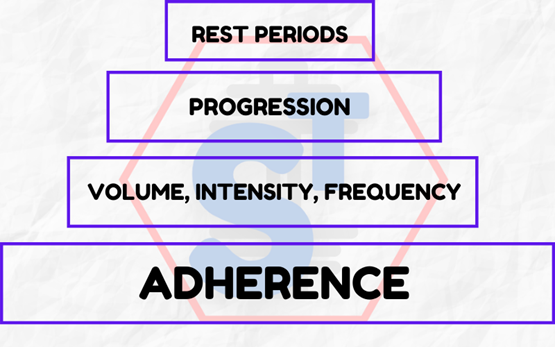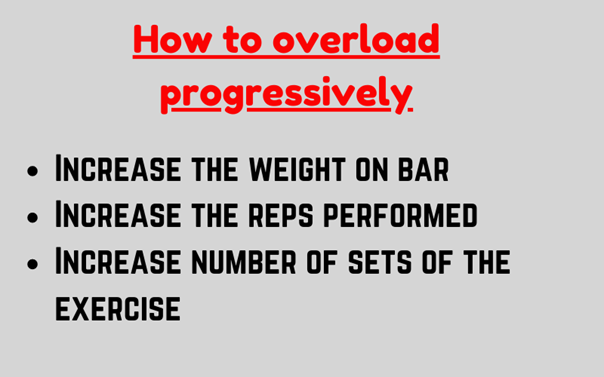The Basic principles of workout are Adherence, Volume, Intensity, Progression, Frequency, Rest periods.
THE MOST
IMPORTANT ONE IS AT THE BOTTOM, THE LEAST IMPORTANT ONE IS AT TOP.
In this blog, I will talk about adherence, volume
and progression. Rest I will cover in forthcoming blog.
ADHERENCE: THE KEY
“If you can’t adhere to your plan even if it is the
best training plan of all time, you won’t get satisfactory results.”
For instance, you downloaded the 6 day training
plan of your favourite bodybuilder from the internet but your lifestyle doesn’t
facilitate you to train 6 days/week, you’ll end up being peeved and
disheartened.
“Even if your plan is not the optimal one but you
find it easy to adhere with, you relish doing it, it will give you results.”
Components of ADHERENCE:
REALISTIC
The first question you should ask yourself is that
if your training program is realistic and doable.
1.
TIME FRAME
If you’ve only one hour in a day to be spared for
training/workout, then your training plan must match with your time frame. I
mean how much sustaining it would be if the training program you created
demands 2 hours and you’ve just one hour to devote to your workout.
“Consistency is what bring the results rather than
perfection”
2. SCHEDULE
You also need to contemplate your schedule on week
to week basis. If you’ve decided that “optimal approach” is training 6 days a
week, yet you’re a father who works 50 hours/week, has a hobby, tends to have
family commitments on weekends, so the “6 days/week plan” isn’t your cup of
tea.
“You’ve to start with what you can do before
deciding what you should do.”
ENJOYABLE
After realistic comes enjoyable. are you feeling
invigorated or drained after a workout? Is your workout giving you joint pains?
So why enjoyment is important? I guarantee that if
you take a suboptimal plan that you love, you’ll put more effort into it than
if you take an optimal plan which you don’t enjoy at all.
Fitness is along term game. So, if you’re not
enjoying your workout, chances are that you’re going to be inconsistent and
ultimately will wimp out of workout/training.
“Optimal doesn’t equal sustainable, don’t set
yourself up for failure.”
VOLUME: A DOUBLE-EDGED SWORD
Volume is the total amount of work you do in the
gym.
volume = sets*reps*weight on the bar.
So, how many sets you should do for one muscle
group/week?
The answer is 10-20 sets per
muscle group per week. Keep in mind the overlapping muscles.
For instance on compound lifts like bench press,
you ain’t just training your chest but also triceps while lifting the bar up
and down. So, by virtue of this maybe you don’t need to train your triceps as
hard as you’re hitting your chest.
Volume is the key driver of hypertrophy(increase in
size and improvement in the shape of muscles) but more volumes isn’t good
always. Many researches have attested that increase in volume beyond 10-20 sets
per muscle per week actually has detrimental effects on strength and
hypertrophy levels, that’s why i called volume a double edged sword. To read
more about volume you can grab a copy of the book training pyramid by eric helms or just
can watch the eric helms video about volume on YouTube.
PROGRESSION
“If you’re going to gym but completely oblivious
about the concept of progression, you’re just breaking the bones.”
What is progression or progressive overload?
It means making your muscles work harder than they
are used to or in simple terms to increase the total work you’re doing in the
gym. By work i mean to say to increase the volume of your workout.
volume = sets*reps*weight on the bar
How to progressively overload?
For instance, you hit 8 reps of bench press with
100kg weight on the bar, now next week when you’ll again hit bench press try to
increase the weight on the bar or the reps with same weight. You don’t need to
increase the weight drastically, even the increment of 1kg or 1 rep will
increase the total volume of your workout, don’t make big jumps.
“progress is progress even if it is slow or
imperfect.”
So, that’s all about today’s blog. I will cover
rest of the principles in forthcoming blog. Till then, take care, keep
exercising, stay fit and be benevolent towards others.



Comments
Post a Comment